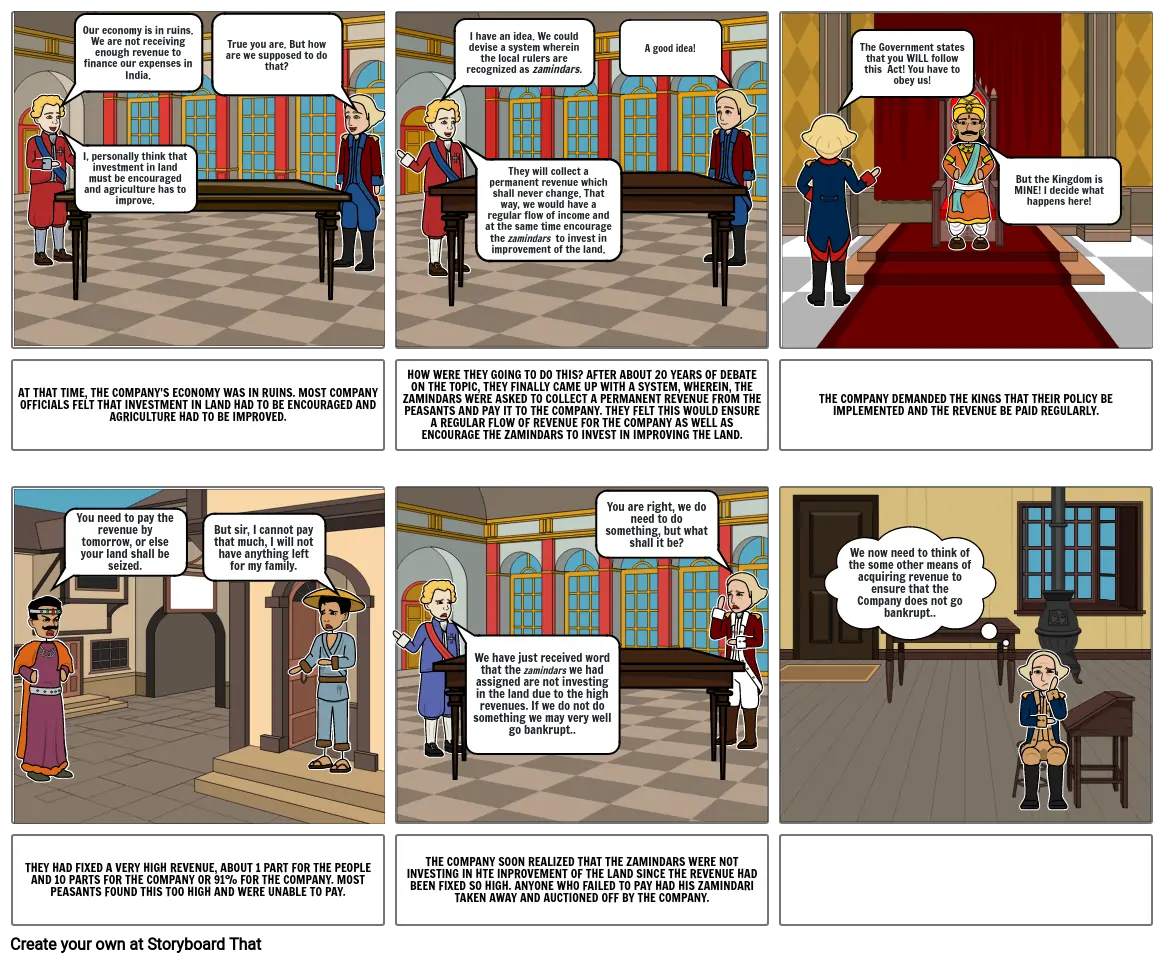Permanent Settlement

Öykü Açıklama
This is a storyboard regarding the policy of the English East India Company called Permanent Settlement devised by Thomas Munro and introduced by Charles Cornwallis in 1793.
Öykü Penceresi Metni
- Our economy is in ruins. We are not receiving enough revenue to finance our expenses in India.
- I, personally think that investment in land must be encouraged and agriculture has to improve.
- True you are. But how are we supposed to do that?
- I have an idea. We could devise a system wherein the local rulers are recognized as zamindars.
- They will collect a permanent revenue which shall never change. That way, we would have a regular flow of income and at the same time encourage the zamindars to invest in improvement of the land.
- A good idea!
- The Government states that you WILL follow this Act! You have to obey us!
- But the Kingdom is MINE! I decide what happens here!
- AT THAT TIME, THE COMPANY'S ECONOMY WAS IN RUINS. MOST COMPANY OFFICIALS FELT THAT INVESTMENT IN LAND HAD TO BE ENCOURAGED AND AGRICULTURE HAD TO BE IMPROVED.
- You need to pay the revenue by tomorrow, or else your land shall be seized.
- But sir, I cannot pay that much, I will not have anything left for my family.
- HOW WERE THEY GOING TO DO THIS? AFTER ABOUT 20 YEARS OF DEBATE ON THE TOPIC, THEY FINALLY CAME UP WITH A SYSTEM, WHEREIN, THE ZAMINDARS WERE ASKED TO COLLECT A PERMANENT REVENUE FROM THE PEASANTS AND PAY IT TO THE COMPANY. THEY FELT THIS WOULD ENSURE A REGULAR FLOW OF REVENUE FOR THE COMPANY AS WELL AS ENCOURAGE THE ZAMINDARS TO INVEST IN IMPROVING THE LAND.
- We have just received word that the zamindars we had assigned are not investing in the land due to the high revenues. If we do not do something we may very well go bankrupt..
- You are right, we do need to do something, but what shall it be?
- THE COMPANY DEMANDED THE KINGS THAT THEIR POLICY BE IMPLEMENTED AND THE REVENUE BE PAID REGULARLY.
- We now need to think of the some other means of acquiring revenue to ensure that the Company does not go bankrupt..
- THEY HAD FIXED A VERY HIGH REVENUE, ABOUT 1 PART FOR THE PEOPLE AND 10 PARTS FOR THE COMPANY OR 91% FOR THE COMPANY. MOST PEASANTS FOUND THIS TOO HIGH AND WERE UNABLE TO PAY.
- THE COMPANY SOON REALIZED THAT THE ZAMINDARS WERE NOT INVESTING IN HTE INPROVEMENT OF THE LAND SINCE THE REVENUE HAD BEEN FIXED SO HIGH. ANYONE WHO FAILED TO PAY HAD HIS ZAMINDARI TAKEN AWAY AND AUCTIONED OFF BY THE COMPANY.
-
30 Milyondan Fazla Storyboard Oluşturuldu

